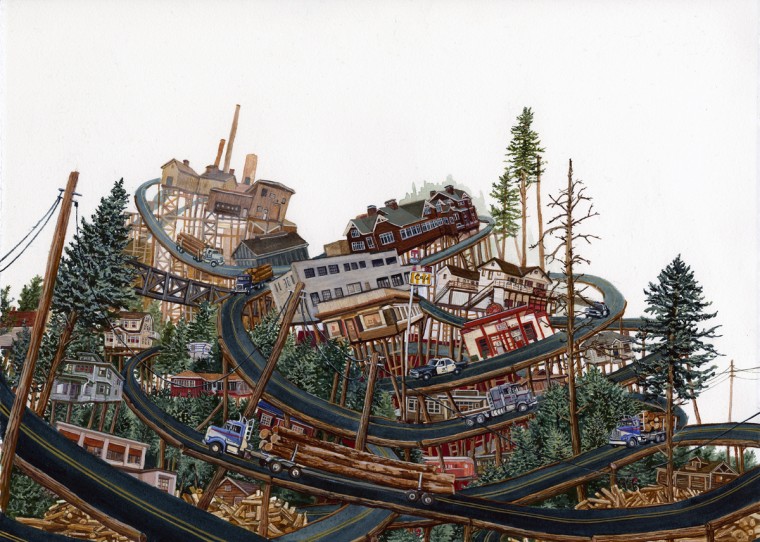 Amy Casey, A Small Logging Town, 2011, Acrylic on Paper, 13″ X 7″
Amy Casey, A Small Logging Town, 2011, Acrylic on Paper, 13″ X 7″
What It Feels Like On A Sunday Night In The Summer
Outside is a jungle and everything
is wild and everything is living and holding
its breath and we don’t wear the brutality
of the atmosphere like an ill-fitting suit made
of dark, heavy wool and smoldering hate: it wears us.
The world turns and brings fresh burdens and yet
the world has long made it clear that it will always
turn and bring fresh burdens.
Gutted, the sky bleeds out and gloams us
all in shawls of dusk and shadows. Children’s
voices skirl over the tops of wooden fences and
into backyards and through the trees pining
for the wind. We know that some burdens lay
heavier than others. Some things cannot be backed down.
______________________
Tyrel Kessinger
Review by Jared Pearce
The discomfort and the fortitude come through the images wonderfully in this poem. The idea of sitting around the muggy evening in a “heavy wool,” “ill-fitting suit” adds to the idea that life is rough. There are hints that the burdens might be worth the struggle and pain, just as “Children’s / voices skirl over the tops of wooden fences” might offer us a glimpse of other realities or even why the “burdens” which “cannot be backed down” are worthwhile, in the long run. This is a quiet poem, a poem that looks on life with a stern eye, a poem that takes life and says it’s ready to rock, but does so amongst the gloaming, the rest that prepares for struggle.
Review by David Memmott
The poets sets up a dark atmosphere of wild nature with a nice turn on “it wears us.” The world turns as it always does. Then my favorite part of the poem begins with “Gutted, the sky bleeds out and gloams us/all in shawls of dusk and shadows.” After the use of “gloams” as a verb, which feels fresh and surprising in this context, the poet serves up another nice verb with “skirl” that rises over fences and the “trees pining for the wind.” Then we’re returned to the heavy burden of the “dark, heavy wool” of lines 4 and 5. The poem feels like it too “turns and brings fresh burdens,” but we turn with it. It feels whole and cyclical.
